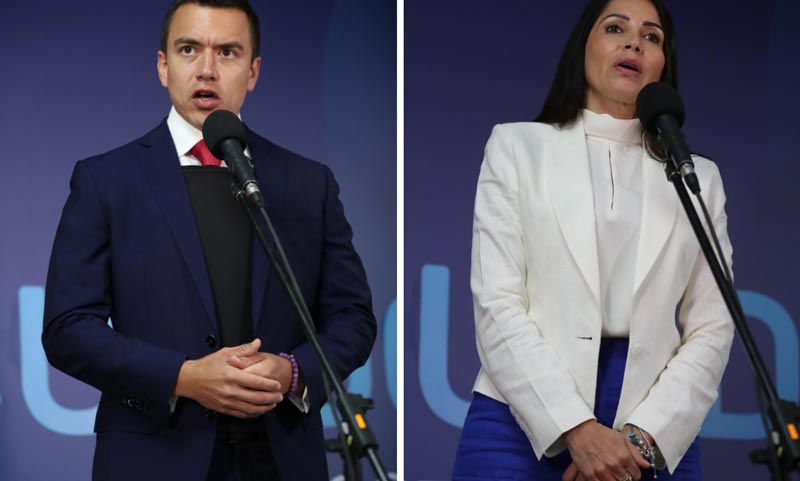The National Electoral Council (CNE) recently unveiled the rules for the upcoming presidential debate featuring Daniel Noboa and Luisa González. This debate, set to address critical issues, is scheduled for October 1st, running from 7:00 p.m. to 9:00 p.m.
The highly anticipated second -round Presidential debate between Daniel Noboa and Luisa González is expected to shape the course of the forthcoming election. The four central themes of the debate will encompass the economy, security, social concerns, and political matters.
New format
Patricia Hidalgo, a member of the debate committee, has undertaken a careful review of the previous round of debates, resulting in some significant adjustments. The most notable change is the extension of response times for general questions to a more generous two minutes. Additionally, replies and cross-questions will be limited to a succinct 25 seconds, followed by an additional minute for responses. Each thematic block is allotted a substantial 25 minutes, allowing for an in-depth exploration of these critical topics.
On September 26th, the public will witness a transparent draw to determine the order of participation for the candidates. This will be conducted under the watchful gaze of a notary, adding an element of excitement and suspense to the proceedings. Furthermore, the questions that will be posed during the debate will only be disclosed to the moderator, Ruth del Salto, two hours before the event, ensuring that the candidates cannot prepare scripted responses and adding an element of spontaneity to the discussions.
The four central themes
The economic axis of the debate promises to tackle pressing concerns that impact the nation’s well-being. Questions in this category will revolve around the fair distribution and prudent management of the state’s economic resources. Additionally, the candidates will be challenged to articulate their strategies for confronting and mitigating the notorious El Niño phenomenon, which has historically wreaked havoc on the nation. Promoting job creation will also take center stage, with each candidate outlining their plans for stimulating job growth. Perhaps one of the most significant issues to be addressed is the evaluation of the public policy regarding the adoption of the dollar as the official currency, a decision that has far-reaching economic implications and impacts every citizen.
In the security axis, the candidates will be tasked with addressing crucial issues related to the nation’s safety and well-being. Questions will encompass the comprehensive management of the national security system, probing the effectiveness of current policies and strategies. Additionally, the candidates will be asked about subregional integration policies aimed at tackling organized crime, a pervasive issue with regional implications. The debate will also delve into the evaluation of intelligence strategies in combating organized crime while preserving the rights and security of the population. A particularly sensitive issue that will be addressed is the alarming problem of forced disappearances of individuals, necessitating a comprehensive strategy for protecting human rights.
The social axis will focus on vital aspects of the nation’s social fabric. The candidates will be called upon to address the critical topic of education, including issues such as improving the quality of education, ensuring equitable access, enhancing teacher training, and investing in much-needed infrastructure. Healthcare, another essential component of the social fabric, will be a focal point, with candidates expected to outline their visions for the development of the healthcare system, ensuring its capacity to serve the needs of the population. Furthermore, the debate will delve into the challenges faced by children and adolescents, with a particular focus on child malnutrition and adolescent mental health. Lastly, candidates will need to present comprehensive plans for promoting the inclusion of vulnerable groups and championing their rights in society.
In the political axis, a forum for direct interaction between the candidates and the debate moderator, several critical issues will be addressed. These issues resonate deeply with the nation, impacting its governance and future direction. The prospect of conducting a popular consultation or a constituent assembly to enact reforms to the Constitution will be explored. The candidates will also provide insights into their vision for governance alongside the National Assembly within the first year and a half of their potential presidency. Furthermore, the governance and representation of social security, specifically how the IESS (Instituto Ecuatoriano de Seguridad Social) is administered, will come under scrutiny. Lastly, the candidates will articulate their vision for the nation’s posture on the global stage, delineating their approach to diplomatic and commercial relations with other nations.
The forthcoming presidential debate between Daniel Noboa and Luisa González holds immense significance for the nation. The meticulous planning, well-defined thematic axes, and transparent procedures underscore the importance of this event in shaping the country’s future. As the candidates prepare to articulate their visions and strategies, the nation watches closely, understanding that the outcome of this debate will play a crucial role in determining the trajectory of the nation’s future. It is an event where citizens expect to gain deeper insights into the candidates’ positions on pressing issues, allowing them to make informed choices when they head to the polls.


0 Comments